Can music help us become smarter (8 most important questions)? (Featuring @dedi as Author)
Music can help us boost our abilities and concentration. In this article we have chosen 8 most important questions how music affects brain.
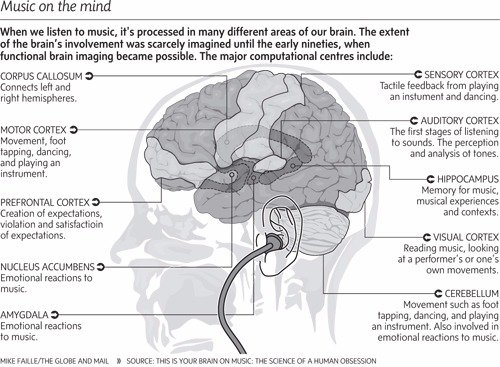
1. Can music make us happier?
Music is as much expressive as normal human language. Since music carries much more powerful emotional charge than the real-life events, modern psychologists use it for the therapy. It can be explained by positive impact on the human nervous system. Emotions that rise during the process of listening to the music can be divided into two types - perceived and felt. This means that a person is able to understand the mood of a piece of music, even if he had never experienced such feelings in real life. So, when someone is in depression, happy music only makes it worse. On the contrary, sad music makes a person fell better.
2. How the background noise affects the quality of the work?
When you doing something routinely and boring you just put on the headphones, expose the desired volume, select the desired playlist and press a button «play». Wherever, when it comes to work that requires activation of the right hemisphere (to do something creative), loud music is unlikely to help. As it turned out, the average noise level is a catalyst for creativity. The background noise stimulated abstract thinking and boost creativity. That is why public places such as cafes, summer playgrounds and parks are so attracted for creative people. When the noise level is too high it overloads the human brain - it tries to process the information as quality as possible and to distract from all the other actions.
3. Is it possible to determine the character by knowing his/ her taste in music?
Scientists have shown that there is a certain relationship between musical genres preferred by the person and his character. Experiment was carried out. In the first part of the experiment, 36 518 teenagers from all around the world had to rank the 104 genres of music, depending on their personal preferences. The next stage of the experiment was more complicated: the participants were divided into pairs and they tried to identify the characters of the partners, base on their Top-10 songs playlist. 5 qualities were selected for analysis:
- openness to new experience;
- extraversion;
- courtesy;
- honesty;
- emotional balance.
Scientists have come to the following conclusions:
- blues fans are creative, outgoing, polite and arrogant;
- jazz lovers are most often found creative, friendly people with high self-esteem;
- fans of classical music are introverted personality type, but despite this, have a high sense of dignity and extraordinary creative abilities;
- rap fans are outgoing and a bit selfish;
- opera lovers are polite, open, creative personality;
- fans of country are distinguished by their hard work and the ability to easily find a common language with others;
- fans of reggae (reggae) have a high self-esteem, creative and sociable, but hard work - it's definitely not about them;
- rhythmic dance music lovers are extroverted personality type have certain creative abilities, but do not have good manners;
- the fans of indie (indie) low self-esteem, they are hard-working and often poorly educated;
- fans of heavy music (heavy metal (heavy metal), hardcore, etc.) have low self-esteem and lot of creativity.
The results allowed the scientists to develop a unique model that displays the relationship between music preferences and the nature of the person:
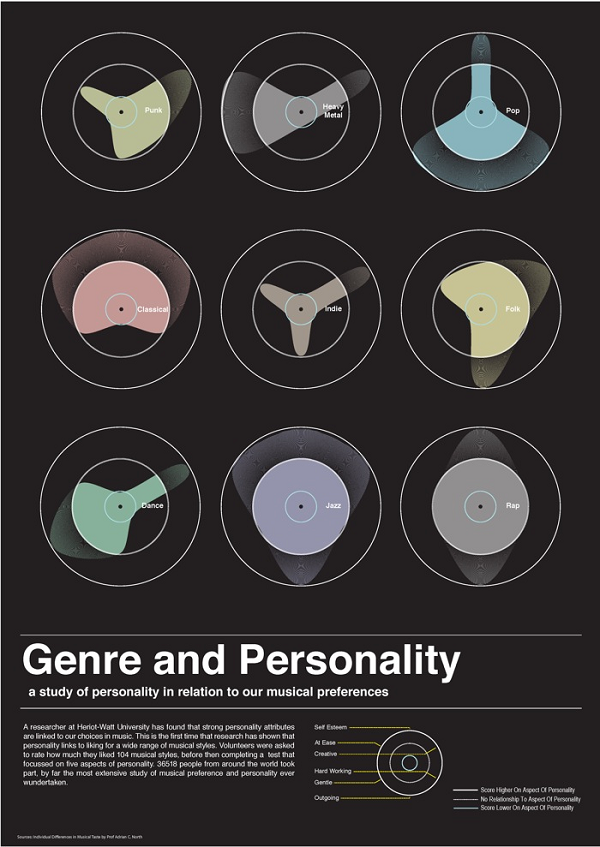
4. Should I listen to music while I am driving?
Scientists have studied how music affects drivers. They tested three types of music: ? music that participants of the experiment had chosen; ? "safe" composition proposed by the scientists; ? the complete absence of any musical accompaniment. Scientists have suggested that the results will be the following:
a) drivers will make most errors during the ride, accompanied by tracks they have chosen;
b) On the second place there will be absence of musical accompaniment;
c) The best results will be for the tracks proposed by researchers. All assumptions were confirmed.
5. Is there any connection between music and logic?
When children learn to play the musical instruments that leads to a favorable effect on the further development. Children that learn to play music instruments for about three years outperform their peers on four factors: the perception of information, motor skills, vocabulary and logical thinking. Thus, the researchers concluded that long-term intensive musical practice has a positive impact not only on the organization of inter-hemispheric auditory and motor functions, but also in the process of redistribution of mental functions between the left and right hemispheres of the brain (lateralization).
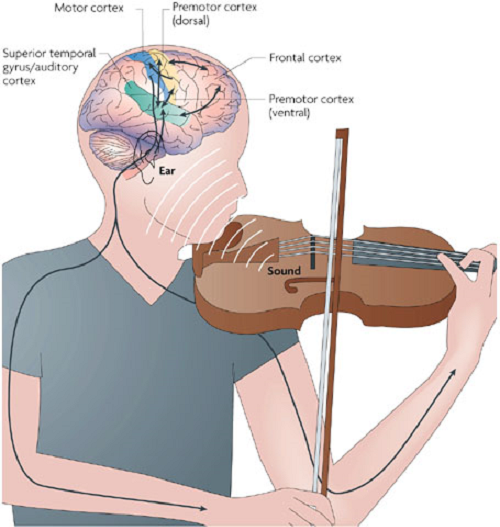
6. How does the classic music influence the stroke victims?
A small study was held by American Occupational Therapy Association that found out that classical music has a certain rehabilitation properties. For one week, the researchers monitored how classical music, white noise and silence affect attention and visual perception of each patient. As is the case with creativity and driving, silence does not live up to expectations of scientists, but classical music has significantly increased the duration of the concentration of the patients improved their attention and visual memory.
7. Why listening to others telephone conversations is harmful?
In the Tokyo subway there is a sign, a warning that telephone conversations disturb other passengers. As it turned out, this has a scientific explanation. According to the study, if a person becomes an involuntary witness of this conversation, his attention is scattered more than if he had heard the full conversation. In the experiment, 164 volunteers were asked to solve a few anagrams. At this time, researchers are actively communicate with each other or talked on the phone, and the participants were not even aware that the case of improper behavior of psychologists was also part of the experiment. Having finished with the job, those students for whom the background served as a telephone conversation, admitted that it significantly reduced their speed and concentration.
8. How to make your workouts more productive?
Scientists over the years examined the influence of music on the workouts. It was found that cyclists pedaled faster, listening to upbeat music than when riding in silence. This happens because the music is simply drowns out the signals of fatigue. The body, feeling physical exhaustion, sends impulses to the brain corresponding to that muscles need time to recuperate. Music, in turn, determines these signals. It should be noted that the music is especially useful during workouts with low to moderate intensity. Now that you know about how music affects your productivity, you only sync your music preferences with the training program.
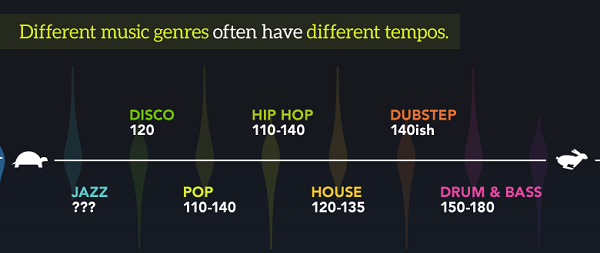
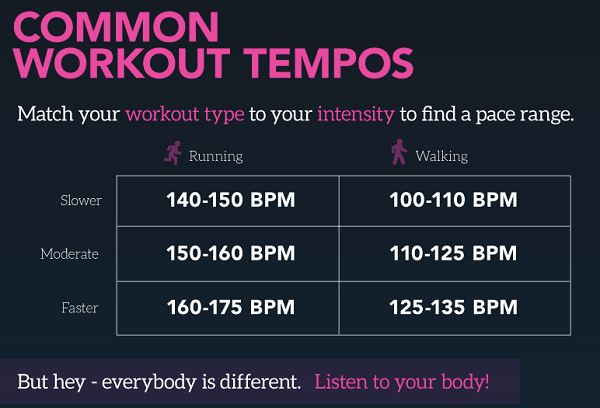
Don't forget to follow @dedi!!
@crazymumzysa features authors to promote new authors and a diversity of content. All STEEM Dollars for this post go to the featured author.
This is more or less a rewrite or summation from the following blog: https://blog.bufferapp.com/music-and-the-brain
nice post
tuning of pitch alters brain function. increase or decrease hemispheric synchronization.
Quiet amazing which different pitches and frequencies do to the mental and emotional bodies. Dip into various resonant harmonics and an amazing amount of personal change can be brought into being with relatively little effort! :)
A fantastic article about music and its influence as well as its parallels with personalities and possible usage. Great work, you sure get my positively biased upvote. Namaste :)
Music exercises the brain
Music specifically developed for improving time and energy spent studying and optimize mental and emotional function such that higher capabilities are reached.
So yes, absolutely, music can help you become smarter!
Researchers at Stanford University, in California, have as of late uncovered a sub-atomic premise for the Mozart Effect, yet not other music. Dr. Rauscher and her associate H. Li, a geneticist, have found that rats, similar to people, perform better on learning and memory tests in the wake of listening to a particular Mozart sonata.
A book called The Mozart Effect by Don Campbell, has dense the world's examination on all the advantageous impacts of specific sorts of music.
how do you get hidden for low ratings with 155 votes? that is several times as many votes as all of my posts put together. i upvoted you. if i could raise these ratings i'd do it twice.
I find that background music helps my productivity as long as there are no lyrics. If there are lyrics, I try to hard to listen to them.
Interesting post! Music has always been such an important part of my life. I can't imagine our world without it.